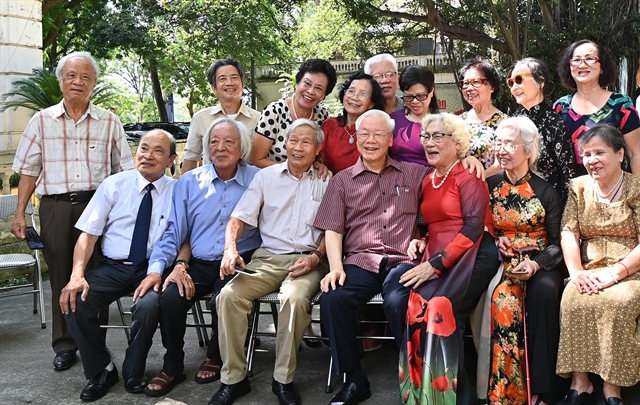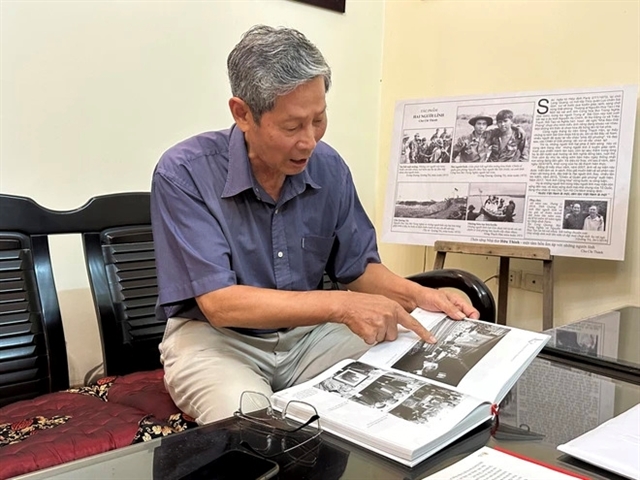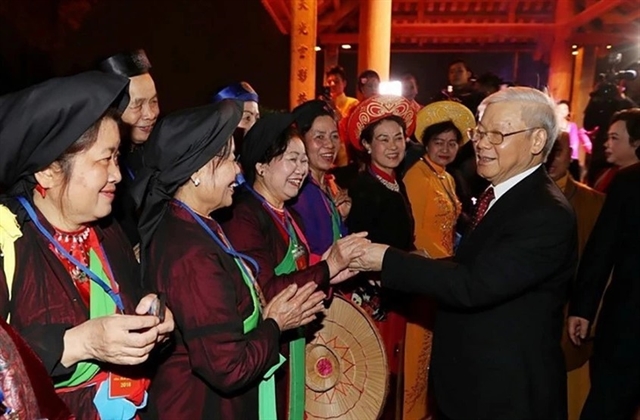HÀ NỘI – General Secretary Nguyễn Phú Trọng, despite occupying the highest position of Party and State leadership, remained a cherished friend to his peers at the Hà Nội University’s Literature Department. His unpretentious demeanor, emotional depth and genuine attentiveness endeared him to all.
In the recollections of his old classmate, journalist and photographic artist Chu Chí Thành, who was a war correspondent for the Vietnam News Agency, General Secretary Trọng emerges as a paradox – outwardly slow-paced, soft-spoken and with a gentle gait, yet harbouring an unwavering will – a lifetime commitment to serving the people and the nation.
Youth's dreams and ideals
He became emotional revisiting his youth with General Secretary Trọng in Literature Class VIII at the Hà Nội University (1963-1967), but Thành takes immense pride in his class – a group of dreamers and idealists, poised to charge into battle, whether wielding pens or cameras.

General Secretary Nguyễn Phú Trọng poses for a photo with his teachers and classmates of the Literature Class VIII, Hà Nội University (period 1963-1967) in a gathering at the headquarters of Nhân Dân (People) newspaper in Hà Nội in June 2022. Photo nhandan.vn
For him, the Party leader was a friend etched in his mind – a young man with a gentle smile that radiated amiability. Their bond deepened during the years of evacuation in Đại Từ District in the northern mountainous province of Thái Nguyên, where they lived together in farming families, working together, building a school and studying side by side.
“Back then, Trọng was an active member of the Youth Union, being a familiar figure to all. The older students held a vested interest in shaping the next generation to be future Party members, journalists, cultural figures, poets and writers. It was during this pivotal period that the elders noticed Nguyễn Phú Trọng’s unwavering commitment. In his final year, he was recruited into the Party. Meanwhile, we were destined for the battlefield,” Thành recalled.
After graduation, his friend Nguyễn Phú Trọng was employed at the Cộng Sản (Communist Review) magazine, starting as an editor, then gradually became the person in charge of the magazine – this was also the career progression of a journalist.
"From the 90s onwards, the country's economy had started to improve, we wanted to reconnect with each other and we would almost always meet up after Tết, and organised many of the gatherings at the Vietnam News Agency, where memories flowed and bonds rekindled," Thành said.
The veteran journalist said that he owes the Party leader a 'thank you' as he played a key role in the establishment of the National Archives and Exhibition Centre Artistic Photos.
When Thành was the Chairman of the Việt Nam Association of Photographic Artists (VAPA) (2006-2009), he wished to complete the establishment of the archives centre.
“Although the Vietnam News Agency has the largest photo archive in the country, it primarily consists of news and political photos, while other types of photos (such as historical photos before 1945) are not available. Additionally, photos from the general public across the country are also not included. Therefore, we wanted to establish an Archives Centre under the VAPA with a broader scope, so that we can have a more diverse and valuable photo collection about the country,” Thành said.
He immediately thought of his friend Nguyễn Phú Trọng, who was then the Secretary of the Hà Nội Party Committee.
“Hearing the proposal for a photo archive about the country, people and revolution, Trọng agreed and in just a week I had in my hand a referral for land grant approval from the city People's Committee. The project had been going on for 14 years and had yet to be implemented and in just three years, the centre was opened,” Thành said.
Revolutionary literature carried us forward
In the spring of 2011, Thành’s old classmate took office as the General Secretary of the Central Committee of the Communist Party of Việt Nam. All the members of the Literature Class VIII gathered to congratulate Nguyễn Phú Trọng on his new position and also to applaud their teacher Hà Minh Đức on his 76th birthday.
Thành recalled that at the class reunion, his friend Trọng was very respectful and deferential towards teacher Đức. Despite holding the highest position in the Party, he said humbly: "This is the result of the Party's training, the teachings of teachers, and the encouragement and support of our classmates."
The General Secretary also shared: "There are people in our class who are more talented and have endured greater hardships going to battlefields, but I was fortunate enough to enter politics – this was not due to any special innate abilities."

Journalist and photographer Chu Chí Thành recalls memories with classmates of the Literature Class VIII, Hà Nội University (period 1963-1967). Photo courtesy of Vietnam+
According to Thành, when in the university, they all admired Trần Hưng Đạo [a 13th-century military commander] with his Hịch Tướng Sĩ (The Exhortation to the Military Generals), Nguyễn Trãi with Bình Ngô Đại Cáo (Declaration of the Restoration of Peace), Nguyễn Bỉnh Khiêm (aka Trạng Trình) with his poetic works and other writers from the pre-revolutionary period such as Nam Cao, Nguyễn Công Hoan, Xuân Diệu, Chế Lan Viên, Tế Hanh and Nguyễn Đình Thi.
“At that time, we did not think we would get into politics, and neither did Trọng, because we were all still students and didn't know what we would end up doing or where. Life and the revolution led us forward, and Trọng was one of the students who went on to succeed in the political path,” Thành said.

General Secretary Nguyễn Phú Trọng meets Hà Nội’s artists on the occasion of Lunar New Year Festival on February 15, 2018. The Party leader wholeheartedly dedicated to the development of Việt Nam's progressive culture. VNA/VNS Photo
Attending the 75th anniversary of the Việt Nam Association of Literature and Arts in 2023, General Secretary Trọng gave a speech, in which he expressed his concern that there are not many works that truly contribute to the advancement of our country and nation.
Therefore, the Party leader advised the artists and writers to follow the teachings of late President Hồ Chí Minh, which is ‘Nay ở trong thơ nên có thép’ (Now in poetry there should be steel), meaning that even in peacetime literature, there must be a fighting spirit.
The General Secretary was also a leader who was wholeheartedly dedicated to the development of Việt Nam's progressive culture. When implementing the Party Central Committee's Resolution on cultural and artistic work, he deeply absorbed the task and mission that President Hồ Chí Minh have identified: "Culture must light the way for the nation."
“Even in the twilight of his life, he remained steadfast and insightful – a testament to his unwavering commitment. Guided by President Hồ’s wisdom and inspired by patriotic predecessors, Trọng embodied respect and immense value. He was not at all aloof, he never distanced himself from his teachers, students and friends and always lived in genuine harmony. This essential quality defines Nguyễn Phú Trọng, earning him the highest esteem,” Thành said. VNS
OVietnam